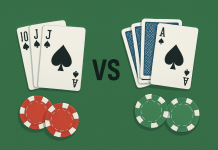Casino Games in the Metaverse: Who’s Already Building Them?
The metaverse was once a seemingly overused buzzword popularized by the likes of people like Mark Zuckerberg and Elon Musk. But now, this once distant and dystopian concept has become a full-fledged digital ecosystem where people – or should we say their avatars – can interact trade, and now, gamble online for real money. No longer is a night out at a 3D virtual casino on a tropical island merely an idea. It’s a very real possibility, and one that some players are favoring over the traditional real-world casino experience.
But who are the brains behind these immersive playgrounds and why do they appeal so much to players? We did a little digging to find out about the gaming studios powering the metaverse and its thriving casino game scene. Here’s how they’re changing the landscape of online gambling as we know it.
The Rise of the Metaverse Casino
The metaverse is essentially a network of virtual interactive worlds where people can enjoy realistic pleasures digitally. From shopping and socializing to attending events, purchasing virtual real estate and of course, playing game. Players roam these rich and exciting environments in real-time with nothing more than a few clicks of a button. It’s this level of immersion and easy UI experience that makes the metaverse the perfect place for a casino. People can strut onto the virtual neon-lit gambling floor, take a seat at a poker or blackjack table, say hi and interact with the person next to them, and place bets with cryptocurrency – all without leaving the house.
These environments go beyond traditional gameplay. Many use blockchain to support decentralized ownership, smart contract-driven betting, and digital tokens or NFTs (Non-Fungible Tokens) that act as rewards. The result is a new kind of experience where players can not only win money but also earn assets they truly own.
Decentraland’s Immersive Poker Tables
Decentral Games is one of the best known examples of virtual casino gaming. ICE Poker is an blockchain-powered metaverse within Decentraland that can be loaded through your browser. Here, players use NFT wearables to access poker rooms and earn ICE tokens as they play. While it doesn’t cost anything to play, rewards are handed out to those who participate regularly. Within the game, there’s the opportunity to bet with tokens and trade items. The digital economy is so rich, some have even been able to turn their metaverse gambling into a regular side hustle.
As the name implies, the decantralized model is what Decentral Games has become renowned for. This means that the community calls all the shots when it comes to gameplay changes. Reward structures and platform direction from the community go through a DAO, a decentralized autonomous organization. It’s gambling reimagined, with player ownership at the core.
The Sandbox: A Platform for Creative Gambling
The Sandbox is another major metaverse platform where gambling concepts take root. While not built specifically for casinos, The Sandbox lets users build experiences using its Game Maker tool. These include digital slot machines, card tables, and mini-games with token-based mechanics.
Several developers have already purchased land within The Sandbox to create virtual casinos or gambling-inspired social spaces. With big-name partnerships (like Atari and Snoop Dogg), it’s not a stretch to imagine larger-scale gambling environments becoming part of its pixel-styled world in the near future.
Slotie NFTs: Turning Players into Stakeholders
Another interesting project pushing metaverse gambling forward is Slotie. Unlike platforms that focus on gameplay alone, Slotie blends NFTs with revenue-sharing. By purchasing a Slotie NFT, users gain partial ownership in partnered online casinos. This means holders receive a share of profits, early access to new casino games, and perks in future metaverse gambling environments.
Slotie’s roadmap includes virtual slot lounges and exclusive NFT-holder tournaments. And this adds a layer of investment and exclusivity to the gambling experience. It’s a clear sign of how the metaverse is blurring the lines between gaming, finance, and digital ownership.
Sports Betting in Virtual Worlds
Traditional table games and slots aren’t the only popular gambling activities either. Sports betting is also on the rise within the metaverse. Various virtual sporting events take place in giant digital arenas complete with fan lounges and places to wager. Socios.com and Chiliz are two brands leading the charge in virtual sports betting. Here, players have the option to interact and hangout with others during live streams, place bets, and collect NFTs all in the same space.
The Role of the Blockchain
Crypto, NFTs and other decentralized commodities all live in the world of the blockchain. It’s the sophisticated technology that powers these casinos and ensures security and transparency in their operations. While it might seem players are “safer” at traditional casinos because the operator is reposible for their security and ensuring the game are fair, in the world of virtual casinos, the blockchain secures the oeprators and their players with smart contracts. These make it so bets can be properly verified, payouts are fair, and that players have greater autonomy over their crypto wallets.
So far to date, there haven’t been any incidents of fraud at blockchain-based casinos. The extra layers of security make it so gaming is very difficult to tamper with, while the community governance ensures that activities are regulated and that players always get real-world value from their gaming sessions.
What Could Metaverse Casinos Mean For You?
Metaverse casinos are a novel opportunity for players to try something different. The idea of stepping into a fully digital Vegas-style resort, meeting super cool people, playing your favorite games and earning buckets of crypto or other digital assets that you can trade or spend in other random places in the same 3D world is a gamechanger for many—it’s fun, first-class interactive entertainment at your fingertips.
Virtual cjasinos also engage you at different levels compared to traditional gambling venues. You can customise your avatar with NFTs and skins, earn loyalty rewards in the form of collectibles, and even aquire new skills that evolve your character the more you play and interact—much like a pokemon!
Challenges and Caution Ahead
While the metaverse casinos are undeniably exciting, like anything, they aren’t without their downsides. The blockchain has become much more accepted in recent years. But it still struggles with underage gamblers, enforcing responsible gambling practices, and regulating gambling in different international jurisdictions. And while the world of crypto betting might be exciting, it’s also prone to extremely volatile fluctuations and safety risks that not every gambler is prepared for.

Like something out of a Ridley Scott or Spielberg movie, over-immersion is also a very real and possible danger. We already know how addictive social media can be. So, the social features of VR make compulsive gambling behavior in these environments a highly likely possibility. Developers and regulators will need to think very carefully about these risks going forward and ensure there innovation and protection remain balanced.
Looking Forward: Not Just Games, but Experiences
We’re still in the early days of metaverse gambling, but the momentum is undeniable. What’s being built now lays the foundation for a new era of online casinos. And that’s not just websites or apps, but entire worlds where players explore, play, earn, and belong.
For now, metaverse casinos remain a niche within a niche. But as VR headsets become more accessible, blockchain adoption continues to rise, and major brands begin testing virtual spaces, expect to see more movement, and maybe even a Planet 7 presence one day in the metaverse.
Until then, we’ll be keeping a close eye on the developers shaping this space. Because the future of casino gaming might not just be about spinning reels or hitting blackjack—it might be about stepping into a whole new world to do it.




